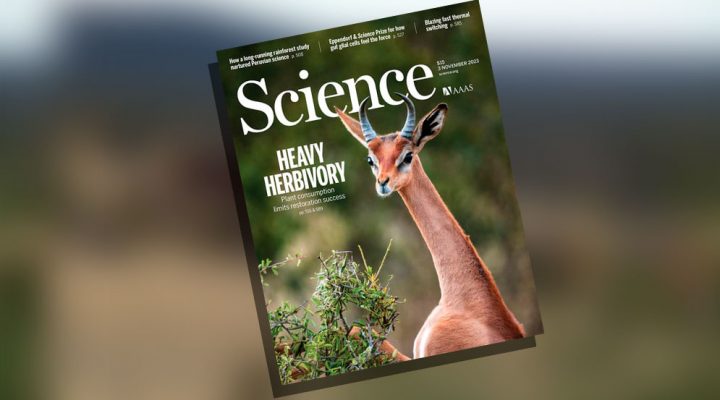Scientists analyze the limiting effect of herbivorous animals on the restoration of vegetation
CONICET researcher Pedro Daleo together with experts worldwide published an article that was on the cover of Science.
Pedro Daleo, CONICET researcher at theInstituto de Investigaciones Marinas y Costeras (IIMyC, CONICET-UNMDP), and specialists worldwide published an article in the prestigious journal Science in which they revealed the harmful role that herbivore animals can play in the restoration of degraded ecosystems. The article arose from the systematic compilation and analysis from more than 2,600 restoration works that were carried out in different types of environments: forests, grasslands, wetlands and marine environments.
The scientist explains that on many occasions the process of “ecological restoration” of natural ecosystems degraded as a consequence of human activity is carried out through replanting the vegetation or allowing its natural recovery. This action aims to first recover the vegetation, which are the primary producers and components of the base of the food web, so that from the recovery of this base – for example, the trees of a forest -, they reach the rest of the the organisms: first the herbivores and then the carnivores that depend on them; resulting in a “healthy and balanced” ecosystem.
The researcher explains that the problem arises in the early stages of restoration, when the recovering vegetation has few defense mechanisms against herbivory, so the effect of herbivory may be greater than that observed in pristine systems, where the vegetation “matures.” It is more protected. At the same time, as carnivores are the last to recover, herbivore populations tend to grow without anyone to control them, ultimately preventing the system from recovering and leading to its collapse. “In this work we show that this amplified effect of herbivores is a general rule in both aquatic and terrestrial restoration projects,” adds the biologist.
Daleo comments that the published research is innovative because it is traditionally thought that natural systems are assembled “from the bottom up”, which is why it has always sought to generate environmental conditions that allow the vegetation to recover, or try to reduce the competition of this vegetation with other plant species that have invaded the degraded system. The article shows that this approach produces a decoupling in the food web, an amplification in the consumption of vegetation by herbivores: they have no one to control them and, in addition, they find themselves with irresistibly unprotected vegetation.
“Ecological restoration is a very expensive activity and until now inefficient. And in that sense, the results of our research have a direct application: finding a way to initially control herbivores, giving plants a window of opportunity to establish themselves, and thus ensuring the success of restoration projects.” Daleo asserts. Initial control, adds the specialist, can be achieved in different ways, which include the recovery of vegetation along with predators, which will keep herbivore populations under control.
“One of the most marked effects of human activity is the simplification of food chains through the loss of top species: carnivores. We now know that its recovery can bring about the restoration of the entire system through what is known as a trophic cascade. Using this knowledge is like discovering new gardening tricks that will allow us a better harvest,” Daleo details.
“If we do not manage to reverse the trend of degradation of natural systems at a global level, we are going to be in trouble, since it is this degradation that is leading to the loss of biodiversity, climate change and putting at risk the resources we need to survive. The problem is that, in less economically developed countries, like Argentina, we are at the stage where we are destroying our natural systems, supposedly in pursuit of economic development. Developed countries have already gone through this stage and have realized that they need to recover those systems that they destroyed,” reflects Daleo.
For the researcher, it is necessary to find an alternative for sustainable development that saves resources in restoring what is lost. “Part of sustainable development should include the recovery of the top predators that we have already lost in most of our ecosystems. It is a clear wake-up call, it is very difficult to recover the systems without a comprehensive vision of their functioning,” adds the biologist.
The article, which was the cover of Science magazine, was led by researchers from Fudan University, China. “Collaboration projects with international groups are incredible opportunities not only from an academic point of view, but also from a social and cultural point of view. The classic models of competition between research groups working on the same question, to get to the answer first, are extremely inefficient. Cooperation, on the other hand, allows us to optimize resources and reach better answers faster,” concludes Daleo.
References
Xu, C., Silliman, B. R., Chen, J., Li, X., Thomsen, M. S., Zhang, Q., … & He, Q. (2023). Herbivory limits success of vegetation restoration globally. Science, 382(6670), 589-594. DOI: 10.1126/science.add2814
By Daniela Garanzini – CONICET Mar del Plata Press Area
